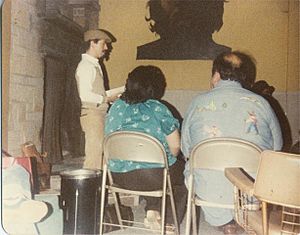Alurista facts for kids
Quick facts for kids
Alurista
|
|
|---|---|

Alurista gives a reading at Colegio Cesar Chavez in Mt. Angel, Oregon, circa 1981.
|
|
| Born | Alberto Baltazar Urista Heredia August 8, 1947 Mexico City, Mexico |
| Occupation | Poet, activist |
| Nationality | American |
| Literary movement | Aztlán |
Alberto Baltazar Urista Heredia (born August 8, 1947), known by his pen name Alurista, is an American poet and activist. His work was very important during the Chicano Movement. He is also a key figure in Chicano poetry.
Contents
Alurista's Early Life and Education
Alurista was born in Mexico City, Mexico. He went to primary school in Morelos. When he was thirteen, he moved to the United States. His family settled in San Diego, California, a city near the U.S.-Mexico border.
He finished high school in 1965. He first studied business at Chapman University. However, he did not like this subject. He then moved to San Diego State University (SDSU) to study religion. He changed his major several times. Finally, he earned a degree in psychology in 1970. He continued his studies at SDSU, getting a master's degree in 1978. In 1983, he earned his PhD in literature from the University of California, San Diego. His PhD paper was about the writings of Chicano author Oscar Zeta Acosta.
Alurista has taught at several universities. These include California Polytechnic State University and the University of Texas at Austin. He has also given talks and read his poems around the world.
His Poetry and Writing
Alurista first wrote poetry as a student in Mexico. He wrote love poems for his classmates to earn money. He started writing poems for others to read in 1966. In 1967, he helped start the SDSU chapter of MEChA. This group, the Movimiento Estudiantil Chicano de Aztlán, means "Chicano Student Movement of Aztlán". He also helped students support the United Farm Workers' grape boycott. He worked for the Volunteers in Service to America (VISTA) program. This program was part of the "War on Poverty" in the 1960s.
In 1969, Alurista attended the First National Chicano Youth Liberation Conference. He read a poem there. The young people at the conference loved his poem. They made it the introduction to the Plan Espiritual de Aztlán. This was an important document for the Chicano Movement. After returning to San Diego, he helped create the Chicano Studies department at SDSU.
In the mid-1990s, he traveled and performed with the Taco Shop Poets. He has shared his thoughts on newer styles of Chicano poetry. He believes that some modern poetry, influenced by Hip hop, is different from traditional Chicano literature.
Standing Up for Change
Alurista was an active member of the Chicano Movement in San Diego. He played a key role in the 1970 event where people took over Chicano Park. He also helped start the Centro Cultural de la Raza, a cultural center. Around this time, he began using the name "Alurista." He chose a pen name for both artistic reasons and for safety. He explained that he faced threats, and he wanted to protect his family by not using his last name. The name change also showed his belief in bringing different ideas together.
In the 1970s, Alurista organized the Festival Floricanto. This was an annual event. Chicano writers and critics would meet to share and discuss their work.
Besides his poetry, Alurista has written non-fiction works. He has also written essays about Chicano culture and history. He helped make the idea of "Aztlán" popular during the Chicano Movement. He gave it a spiritual meaning through his poems. His writings in Spanish were among the first by an American writer to be taken seriously in Spanish-speaking countries. In the United States, he was one of the first poets to mix Spanish and English languages in his highly praised work.
Life Outside of Work
Alurista has been married twice and has four children. He spent some years, from 1995 to 1998, exploring his spiritual side. He moved from San Diego to San Jose, California, in 1998. He was drawn to San Jose's lively arts scene.
Spiritually, Alurista identifies as both a Buddhist and a Roman Catholic. He also respects indigenous practices, like the sweat lodge. Politically, he sees himself as a socialist. He says his views have a strong Mayan influence. He admires Catholicism for its rituals and Buddhism for its meditation. He feels connected to nature and believes everything is linked.
Awards and Recognition
Alurista has received many awards. He has made a big impact in the Chicano community. He has read his poetry all over the world, including Mexico, the United States, and Europe. He was also a producer and the subject of a video called "Torn in Two." This video featured four Chicano poets. It aired in 1984 and won an Emmy award.
Alurista's writings are collected in the "Mexican American Archives at the Benson Collection" at the University of Texas, Austin. He is a professor and scholar. He earned his Ph.D. in Spanish and Latin American literature. In 1984, he received the Jr. MacArthur Chair in Spanish from Colorado College for his excellent teaching. He helped start many academic and community groups. These include Movimiento Estudiantil Chicano de Aztlan at San Diego State, Concilio for la Justicia, Centro Cultural de la Raza, and the Department of Chicano Studies at San Diego State University. His important papers are kept at the University of Texas, Austin, and at California Ethnic and Multicultural Archives.
More to Explore
- Latino poetry
- Chicano poetry
- American literature in Spanish
- Ana Castillo
- Sandra Cisneros
- List of Mexican American writers
 | Claudette Colvin |
 | Myrlie Evers-Williams |
 | Alberta Odell Jones |

